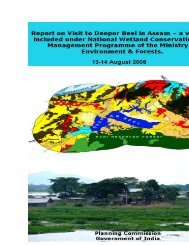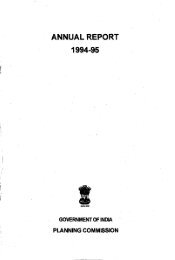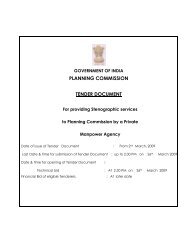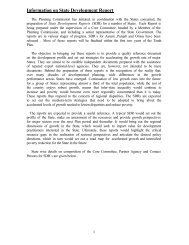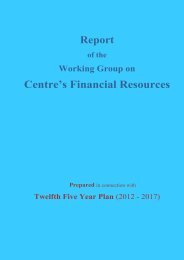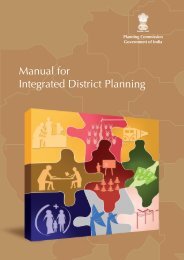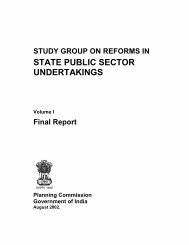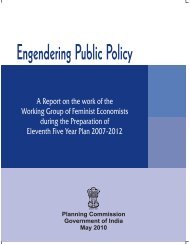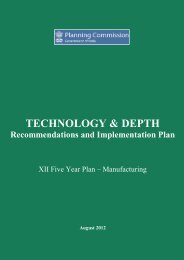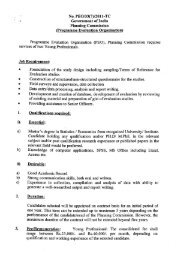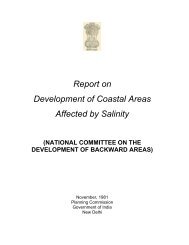National Mineral Policy 2006 - Department of Mines
National Mineral Policy 2006 - Department of Mines
National Mineral Policy 2006 - Department of Mines
Create successful ePaper yourself
Turn your PDF publications into a flip-book with our unique Google optimized e-Paper software.
There are many aspects relevant for reporting in the sector, but not all are easily amenable toperformance indicators and sometimes must be dealt with qualitatively. However, there iswork in progress in a number <strong>of</strong> areas to help advance approaches to measurement on manyimportant issues such as transfer payments (e.g., the Extractive Industries TransparencyInitiative) as well as understanding economic dimensions such as value added.Companies produce a range <strong>of</strong> information in different formats for various audiencescovering activities at both site and corporate level. The GRI framework aims to identifyorganisational level indicators to enable reporting that <strong>of</strong>fers a view <strong>of</strong> the organisation as awhole, whether it has a few or many sites. Sustainability reporting can complement andprovide a framework and context for other types <strong>of</strong> disclosure and communication, many <strong>of</strong>which are already used by companies, including project-level studies and relateddocumentation. Sustainability reports will include some project/site-related information.However, the GRI Guidelines were not designed with the intention <strong>of</strong> specifying all <strong>of</strong> theproject/site level information that may be <strong>of</strong> interest to stakeholder groups.A framework for organisational level reporting must provide indicators that balance the needfor describing an organisation as a whole, with the need for detail that makes suchinformation meaningful. It has not been possible in certain areas to develop genericdescriptions or indicators that provide meaningful information about organisations workingacross a diverse range <strong>of</strong> countries and cultures. Similarly, some information is <strong>of</strong> greaterrelevance when tied to a specific context or location. Case studies are sometimes a useful way<strong>of</strong> illustrating a company’s approach to sustainable development. Reporting on performanceindicators should be supplemented by case studies about challenges, processes, andoutcomes. When used, the case studies should be representative <strong>of</strong> the reporting organisation,i.e. cover the range <strong>of</strong> geographical regions where the reporting organisation operates,include both corporate and local issues, and contain examples <strong>of</strong> where performance has beengood or bad.Decisions on which case studies to include, or whether facts or incidents are “significant” andshould be disclosed, should be guided by the principles in Part B <strong>of</strong> the Guidelines, includingcompleteness and relevance. In particular, information should be given if it would likelyaffect a decision <strong>of</strong> the report user. Reporting organisations should describe the processes andstandards used in determining what is “significant”, either on a case-by-case basis withrespect to each indicator for which the determination is made, or in a summary statement, asappropriate.Some areas <strong>of</strong> stakeholder interest are covered in disclosures required by existing regulationsor laws, such as financial reports or reports to the South African government on compliancewith legislation on Historically Disadvantaged South Africans. It is important that companiesconsider the principles outlined in Part B <strong>of</strong> the Guidelines and how they should be applied inthe context <strong>of</strong> each company’s own business operations to guide disclosures.In preparing sustainability reports, it is important for organisations to provide information onthe overall approaches to key issues such as social and economic capacity building at thecommunity level or other broad topics. This information complements the more specificperformance indicators that appear in a report and helps to provide a broad context.Partnerships are important in solving challenges to sustainable development in the sector.Companies should therefore include a narrative discussion about the partnerships they have278



